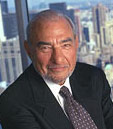|
|
|
Vegas Priest Pleads Guilty to Battery
Criminal Law |
2007/09/21 07:44
|
| A Roman Catholic priest who smashed a wine bottle over the head of a woman in church pleaded guilty to felony battery with a deadly weapon. The Rev. George Chaanine admitted Thursday in Clark County District Court that he smashed the bottle over the 54-year-old woman's head at Our Lady of Las Vegas Catholic Church in January. Prosecutors dropped other charges, including attempted murder and sexual assault. "Our prosecutors analyzed the case, they spoke with the victim, and she thought it was best to resolve this case short of trial," District Attorney David Roger said. Neither the woman nor her lawyer could be reached for comment. Chaanine, 53, remained in jail on $1 million bail pending sentencing Nov. 1. The battery charge carries a maximum prison term of six to 15 years, but Chaanine could be eligible for probation, officials said. He remains suspended by the Diocese of Las Vegas. The district attorney said that as a convicted felon, Chaanine would "probably never be a priest again." Deputy Public Defender Scott Coffee said Chaanine took responsibility for the attack, but "vehemently denies there was any sexual assault." The woman sang at the church and was hired by Chaanine in October as the parish events coordinator. She accused Chaanine of hitting her in the head with a wine bottle on Jan. 26, stomping on her hand, groping her and choking her until she began praying. She said he suddenly stopped and fled. Chaanine was arrested almost a week later near Phoenix. The woman was treated for a broken hand and a gash on the head, authorities said. Both sides characterized Chaanine's relationship with his accuser as more than priest and parishioner, but they did not say the two were romantically involved. Bishop Joseph Pepe, the head of the Las Vegas Diocese, issued the a statement Thursday characterizing the church community as saddened and saying he prayed for "unity and strength" in the congregation. |
|
|
|
|
|
|
Law Firm Co-Founder Accused Of Conspiracy
Legal Careers News |
2007/09/21 07:39
|
| Federal prosecutors are expected to indict trend-setting, class-action lawyer Melvyn Weiss on Thursday as part of a long-running legal action charging his law firm paid plaintiffs, Milberg Weis s said. Weiss, who made millions suing U.S. corporations on behalf of shareholders, is no longer working in the firm's management but concentrating on defending himself, Milberg Weiss said in a statement posted on its Web site. "Milberg Weiss understands that a second superseding indictment will be issued tomorrow that will include new charges against the firm and also Melvyn Weiss," the statement said. Weiss, 72, long reigned as the king of U.S. class-action litigation, casting himself as the protector of the common investor and creating enemies throughout corporate America. Weiss' lawyer was not immediately available for comment. Milberg Weiss said it remained proud of its and Weiss' accomplishments and did not anticipate the indictment would interrupt its work. News of Weiss' pending indictment came a day after another of the firm's former partners, William Lerach, agreed to plead guilty to criminal conspiracy and go to prison for his involvement in the scheme. On its Web site, the Wall Street Journal said another former partner at Milberg Weiss, Steven Schulman, is on the verge of reaching a plea deal with the government that will likely be clinched this week. The report cited two people familiar with the situation, who said Schulman's deal may include jail time. Schulman, who was indicted along with the law firm, which has pleaded not guilty to participating in a scheme in which several individuals were secretly paid to serve as plaintiffs in more than 150 lawsuits. A spokesman for the U.S. Attorney's office in Los Angeles declined to comment on media reports regarding Schulman and the statement issued by Milberg Weiss. |
|
|
|
|
|
|
God responds to Nebraska lawmaker's lawsuit
Breaking Legal News |
2007/09/21 07:35
|
| God has apparently responded to a lawsuit filed by a Nebraska lawmaker, and one of the filings seems to have dropped in from the heavens. "This one miraculously appeared on the counter. It just all of a sudden was here - poof!" said John Friend, clerk of the Douglas County District Court in Omaha. The response was one of at least two to a lawsuit filed against God last week by state Sen. Ernie Chambers of Omaha, the state's longest-serving lawmaker. Signed by "God," the response filed Wednesday argues the defendant is immune from some earthly laws and the court lacks jurisdiction over God. Blaming the Almighty for human oppression and suffering misses an important point, it says. "I created man and woman with free will and next to the promise of immortal life, free will is my greatest gift to you," according to the response, as read by Friend. St. Michael the Archangel is listed as a witness, Friend said. Another response - also signed God - says the Lord disputes Chambers' allegations. That filing lists a phone number for a Corpus Christi law office. A message left for that office was not immediately returned Thursday. Chambers could not be reached Thursday to comment on the response. He said in his five-page lawsuit that God has made terroristic threats against him and his constituents, inspired fear and caused "widespread death, destruction and terrorization of millions upon millions of the Earth's inhabitants." He's seeking a permanent injunction against God. The self-proclaimed agnostic who often criticizes Christians said his filing was triggered by a federal lawsuit against a judge, filed by a woman who was barred from saying "rape," "victim" and other words in court. Chambers said the woman's lawsuit is inappropriate because the Nebraska Supreme Court has already considered the case and federal courts follow the decisions of state supreme courts on state matters. Chambers said his lawsuit is serious but also makes a point: Anybody can sue anybody. |
|
|
|
|
|
|
Court Allows Boys’ Protest via Buttons
Breaking Legal News |
2007/09/21 07:33
|
| A federal district judge ruled on Thursday that two grade-school students here can wear buttons depicting Hitler Youth to protest having to wear school uniforms. The judge, Joseph A. Greenaway Jr. of Federal District Court in Newark, wrote in a 28-page decision that the button did not "materially and substantially disrupt the work and discipline of the school." The judge based his decision in part on a 1969 ruling by the United States Supreme Court that allowed students in Des Moines to wear black armbands to school in protest of the Vietnam War. He wrote that had the button depicted swastikas, a Confederate flag, or a burning cross, it would have been "plainly offensive" and he would have ruled differently. The schools superintendent, Patricia L. McGeehan, said the district was disappointed in the ruling, and planned to review its options. Ms. McGeehan said in a statement that the district was "very concerned with the precedent this may set not only for Bayonne but for every public school district in New Jersey that tries to create and maintain a school environment conducive to learning and that is not offensive to students or staff." The statement added, "Images of racial and ethnic intolerance do not belong in an elementary school classroom." The dispute over the button began last fall, when Michael DePinto, 11, who was a fifth grader at Public School 14 at the time, objected to the policy. To protest, he and his mother, Laura, 47, made a button that included a photograph of a group of grim, identically dressed members of Hitler Youth with the words "No School Uniforms" imposed over them. After Michael wore the button for several weeks, the district sent a letter to his home in November, demanding that he stop or face suspension. Another fifth-grade student, Anthony LaRocco, then began wearing one as well. After the suspension threat, the boys' parents sued, claiming their First Amendment rights were being denied. Michael said on Thursday that he had never intended to offend anyone but merely make a point about conformity. "It's like forcing a swastika on someone," he said. "It's what Hitler did to his youth."
|
|
|
|
|
|
|
Deadlocked Spector jury sent back to deliberate
Court Watch |
2007/09/21 07:29
|
| The judge in the Phil Spector trial on Thursday ordered the deadlocked jury to resume deliberations on murder charges against the rock producer. Jury deliberations were suspended on Tuesday after the panel said it was split 7-5 over a verdict, without saying which way it was leaning. The panel had been deliberating for seven days. Spector, 67, faces 15 years to life in prison if convicted of murdering actress Lana Clarkson with a gunshot through her mouth at his Los Angeles area home in February 2003. Los Angeles Superior Court Judge Larry Fidler issued new instructions to the jury on Thursday aimed at breaking an impasse after two days of legal arguments with lawyers on both sides. Fidler withdrew a jury instruction -- seen as central to the defense case -- that said the prosecution must prove beyond a reasonable doubt that Spector pointed a gun at Clarkson and the gun ended up inside her mouth while in Spector's hand for them to find him guilty. Instead he told the jury they could consider a range of possible scenarios. Jurors had reported confusion over the original instruction and Fidler agreed it "misstates the law." The defense has argued that the 40-year-old actress, who was working as a nightclub hostess when she met Spector, was depressed over her career and finances and shot herself in the mouth, either deliberately or by accident.
Prosecutors said during the trial that even if the gun went off mistakenly, Spector could be convicted of murder because his actions showed a conscious disregard for human life. Spector, who did not testify in his defense, is famous for pioneering the "Wall of Sound" recording technique in the 1960s and for his work with The Beatles, The Ronettes, Tina Turner and Cher. |
|
|
|
|
|
|
Court upholds ruling in O'Brien firing
Legal Business |
2007/09/21 06:33
|
| A state appeals court has upheld a $2.5 million judgment awarded to former Ohio State University basketball coach Jim O'Brien over his 2004 firing. The Tenth District Court of Appeals ruled in an opinion issued Thursday that the Ohio Court of Claims rightfully decided in favor of O'Brien. The former coach had argued his concealment from the school of a personal loan he gave to a recruit in late 1998 did not warrant his dismissal. After the ruling, both parties appealed, OSU claiming the court erred in finding the former coach didn't materially breach his contract. The university added that additional instances of misconduct released by the NCAA in early 2006 should have barred O'Brien's claim altogether. O'Brien also appealed the original ruling, claiming the court didn't properly calculate the amount of damages due and that OSU shouldn't have been able to reduce the sum because of bonus amounts they previously paid. O'Brien was fired after he told former OSU Athletics Director Andy Geiger that he made the loan to the family of Aleksandar Radojevic, a prospect from Serbia. Radojevic never played for the Buckeyes, but O'Brien said he made the loan because his family was in financial straits following the death of Radojevic's father. Geiger reported the transaction to the NCAA in May 2004 and O'Brien was terminated in June, according to court documents. The ruling that awarded O'Brien the judgment found that OSU's termination wasn't for a "material breach," defined as an act that defeats the entire purpose of the contract. The appeals court found that "NCAA compliance was but one of O'Brien's many duties." The court added in its ruling that the stipulation in O'Brien's contract, approving termination for a material breach or NCAA violation, didn't allow OSU to determine a violation occured before the NCAA handed it down. The termination created "a 'bootstrapping effect' by allowing OSU to substitute its own judgment for that of the NCAA," the opinion stated. The NCAA didn't issue an official ruling regarding O'Brien's violations until early 2006, and "even if it would have been proper to terminate him at that time, much of the liquidated damages awarded to O'Brien in the judgment of the trial court would have been earned as salary," the court said. OSU is expected to issue a statement Thursday afternoon. |
|
|
|
|
|
|
Phila. law firm hit with discrimination suit
Law Center |
2007/09/21 05:39
|
| Philadelphia law firm Cozen O'Connor has been sued by a former partner who alleges that she was not given the same leeway regarding political activities as male employees. Patricia Biswanger claims in her sex discrimination and retaliation suit that she was fired from her position as a non-equity partner in September 2005, less than a month after she filed a gender discrimination complaint with the firm's human resources department. The suit, filed Wednesday in U.S. District Court in Philadelphia, charges that her political activities in Haverford, Pa., caused Cozen O'Connor to apply a double standard that prohibited her from using any firm resources such as phones and email for those activities. She said the firm placed no restrictions on male lawyers' political activities. The suit says that instead of investigating the complaint, the firm instead tried to prove that she violated its policy about using firm resources for political purposes, a charge that she denies. The suit was filed by attorneys Michael J. Salmanson, Scott B. Goldshaw and Katie R. Eyer of Philadelphia's Salmanson Goldshaw and names Cozen O'Connor, firm founders Stephen Cozen and Patrick O'Connor and partner Kevin Berry as defendants. Cozen O'Connor's lawyer, Abraham Reich of Fox Rothschild, said the firm has always provided the same opportunities regardless of gender and that the investigation into Biswanger's complaint was "fair and objective." He said the firm looks forward to refuting the charges in court. Biswanger, an employment litigator, has worked at Rubin Fortunato & Harbison of Wayne, Pa., since December 2005. |
|
|
|
|
|
|
Class action or a representative action is a form of lawsuit in which a large group of people collectively bring a claim to court and/or in which a class of defendants is being sued. This form of collective lawsuit originated in the United States and is still predominantly a U.S. phenomenon, at least the U.S. variant of it. In the United States federal courts, class actions are governed by Federal Rules of Civil Procedure Rule. Since 1938, many states have adopted rules similar to the FRCP. However, some states like California have civil procedure systems which deviate significantly from the federal rules; the California Codes provide for four separate types of class actions. As a result, there are two separate treatises devoted solely to the complex topic of California class actions. Some states, such as Virginia, do not provide for any class actions, while others, such as New York, limit the types of claims that may be brought as class actions. They can construct your law firm a brand new website and help you redesign your existing law firm site to secure your place in the internet. |
Law Firm Directory
|
|











